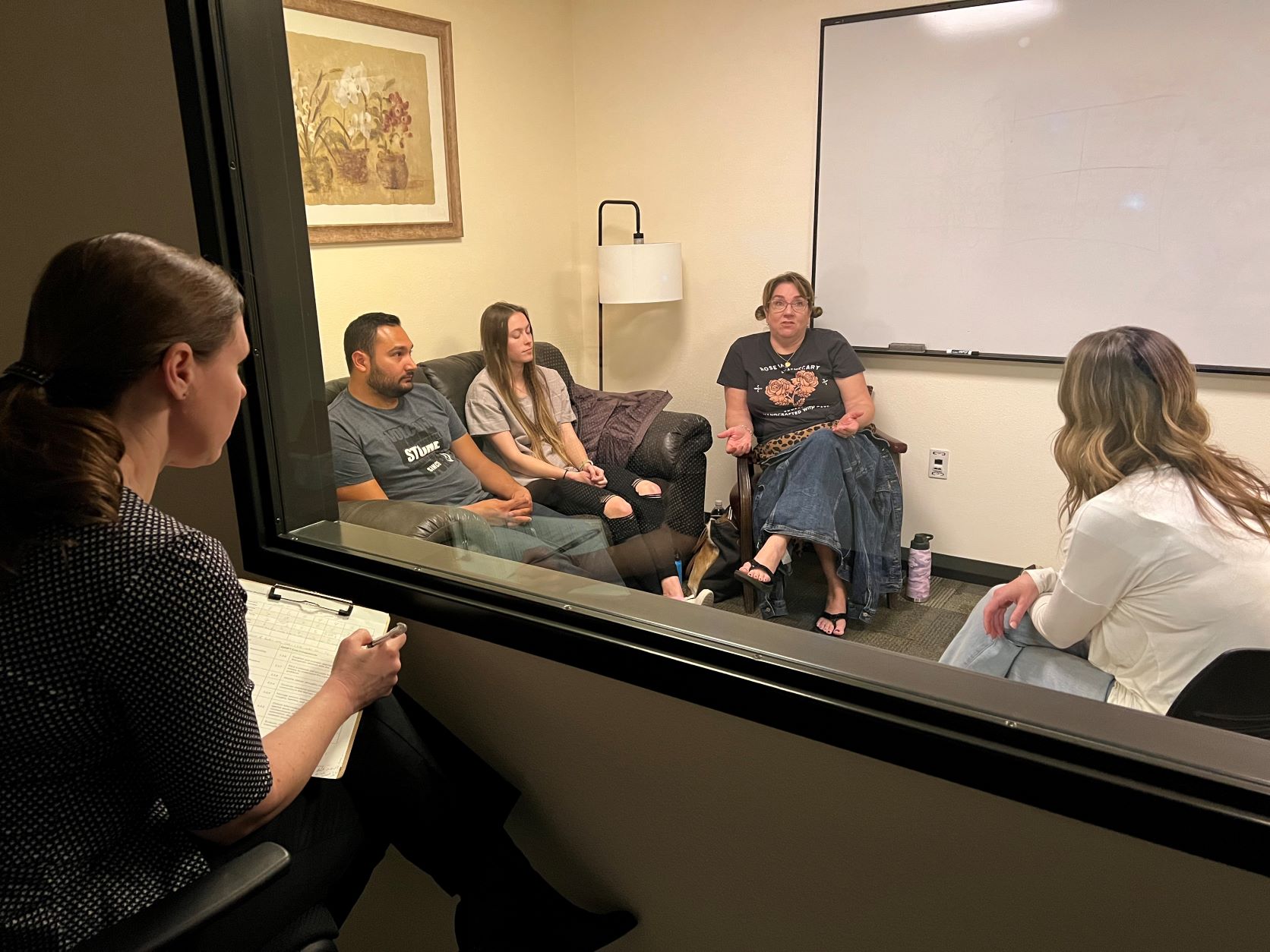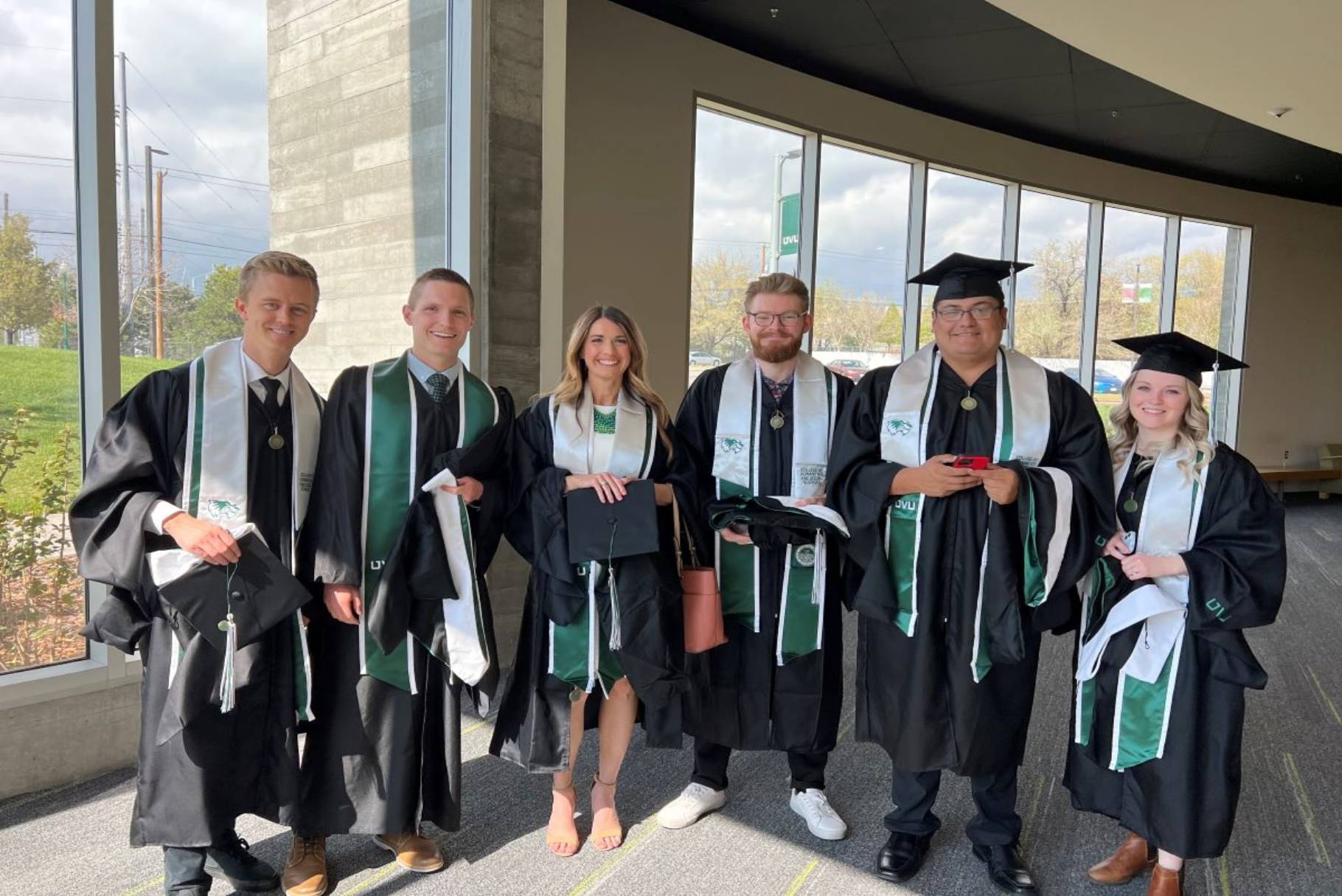The course work for the 54-credit UVU MFT program is designed to be completed in five sequential semesters. Clinical hour requirements may extend the length of the program beyond five semesters (see Clinical Hour Requirements section below).
Students are expected to enroll full-time.
Courses build on previous courses as students develop competence across the program. Subsequently, courses are only offered in the semester listed here. Students who do not enroll in the sequence of courses listed below will need to wait until the course is offered again to take (or retake) a course.
According to UVU policy, the maximum timeframe for completing this program is 6 years from initial matriculation.
Fall and spring semesters, classes are held from 9 - 2:30 Tuesday and Thursday for first-year students and 9 - 2:30 Monday and Wednesday for 2nd-year students. During the summer, classes are held Monday - Wednesday, from 9 - 2:30.
Students should not schedule clients during these hours unless directed to do so by their practicum instructor.
|
Course Number |
Course Title |
Pre-requisite* |
Credit Hours |
|
MFT 6100 |
Ethical Issues in MFT |
3 |
|
|
MFT 6000 |
Systemic Foundations of MFT |
3 |
|
|
MFT 6200 |
Systemic Assessment and Diagnosis |
3 |
|
|
MFT 690R |
Pre-Practicum |
3 |
|
|
Semester total: |
12 |
||
|
Course Number |
Course Title |
Pre-requisite |
Credit Hours |
|
MFT 6010 |
Contemporary Approaches to MFT |
3 |
|
|
MFT 6210 |
Couples Therapy |
3 |
|
|
MFT 6240 |
Individual Therapy |
MFT 6200 |
2 |
|
MFT 6510 |
Contemporary Issues in MFT |
MFT 6000 |
1 |
|
MFT 691R |
Practicum I |
MFT 690R |
3 |
|
Semester total: |
12 |
||
|
Course Number |
Course Title |
Pre-requisite |
Credit Hours |
|
MFT 6400 |
Research in MFT |
MFT 6000 |
3 |
|
MFT 6220 |
Group Therapy |
2 |
|
|
MFT 6500 |
Community Intervention |
1 |
|
|
MFT 692R |
Practicum II |
MFT 691R |
3 |
|
Semester total: |
9 |
||
|
Course Number |
Course Title |
Pre-requisite |
Credit Hours |
|
MFT 6310 |
Child & Adolescent Development |
MFT 6000 |
3 |
|
MFT 6230 |
Family Therapy |
|
3 |
|
MFT 6300 |
Working with Diversity |
|
3 |
|
MFT 693R |
Practicum III |
MFT 692R |
3 |
|
Semester total: |
12 |
||
|
Course Number |
Course Title |
Pre-requisite |
Credit Hours |
|
MFT 6320 |
Adult Issues in Human Development |
3 |
|
|
MFT 6520 |
Either Clinical Business Development |
2 |
|
|
OR |
Special Topics Electives |
1-3 |
|
|
MFT 6600 |
Capstone |
1 |
|
|
MFT 694R |
Practicum IV |
MFT 693R |
3 |
|
Semester total: |
9 |
||
During the Pre-Practicum course, students are introduced to basic clinical skills and expectations. At the end of this course, students are evaluated and must demonstrate competence at an established level to be allowed to progress into the sequence of practicum courses.
During Practicum I, students begin their work with clients at the UVU on-campus clinic. During Practicum II, students are expected to secure an approved off-campus clinical site in order to accrue clinical hours required for graduation. (Please refer to the Practicum Handbook.)
Students need to complete a minimum of 400 face-to-face therapy hours, 200 of which must be with couples or families. Hours are earned only after students are enrolled in Practicum courses, and only at approved sites. During the accrual of clinical hours, students must attend practicum and participate in approved supervision weekly.
Students must complete at least 100 supervision hours, 50 of which should involve direct client data (i.e., live observation, co-therapy with a supervisor, video or audio recording).
To meet hour requirements within the five-semester program, students should accrue 100 therapy hours during each practicum course. Students who do not meet this hour expectation should expect to enroll in practicum courses during sixth, seventh, and/or additional semesters until clinical hours are completed. This may delay a student's graduation.


The UVU MFT program was built on an outcome-based educational framework. Outcome-based education is an approach to program development that starts with the program's goals, including the program's expectations for student competence upon completion of the program. Our outcome-based educational framework also involved the design and structure of curriculum, resources, and policies to support the development of student competence and achievement of program goals. Consistent with our outcome-based framework, the UVU MFT program employs formal assessment processes to evaluate student competence and program goals, and to make data-informed modification and improvements.
Program Goals |
Student Learning Outcomes |
Individual Student Targets |
Program-level Targets |
|
Formative Assessment: Eligibility for Practicum |
Summative Assessment: Eligibility for Graduation |
|||
|
Knowledge of MFT: The program trains students in the knowledge and history of the MFT Profession and how to utilize systemic and developmental theories in their clinical work. |
1. Students will demonstrate understanding of MFT models. |
MFT 6000: ___________ Pass at 83% or better |
Capstone Course: ________ Passing Total Score on Exam |
80% of students will pass the AMFTRB practice exam on their 1st attempt. |
| 2. Students will apply systemic and developmental theories in their conceptualization of clinical cases. | n/a |
Final Practicum: _______ Average score of 4 or higher on Theories Competencies |
On their first attempt, 80% of students will meet/exceed target for Practicum IV Case Presentation theories competencies. | |
|
Competence with MFT Skills: The program trains students to practice relational/systemic therapy including assessment, diagnosis, and treatment of a variety of presenting problems. |
3. Students will demonstrate competent assessment, diagnosis, and treatment with a variety of clinical cases. |
MFT 6200: __________ Pass at 83% or better |
Adult Issues & HD: __________ Passing score of 80% or higher |
80% of students will meet/exceed target on formal submission of the Clinical Tx Paper. |
| 4. Students will utilize published MFT literature to provide research informed therapy. | n/a |
Final Practicum: __________ Average score of 4 or higher on Research Competencies |
On their first attempt, 80% of students will meet/exceed target for Practicum IV Case Presentation research competencies. | |
|
Commitment to inclusion: The program trains students to be aware, knowledgeable, and conscientious in their work with diverse, marginalized and under-served populations. |
5. Students will demonstrate awareness of client context and of their power and privilege as individuals and as clinicians. |
MFT 6900/690R: ______________ Total average score of 3 or higher |
Capstone Course Objective: Structured Clinical Examination (OSCE) ___________ Total average score of 6 or higher |
On their first attempt, 80% of students will meet/exceed target for the OSCE competencies. |
| 6. Student work with marginalized, diverse, and underserved communities will be multiculturally-informed. | n/a |
Adult Issues & HD: __________ Passing score of 80% or higher |
80% of students will meet/exceed target on formal submission of the Clinical Tx Paper. | |
|
Adherence to MFT Ethics: The program trains students to engage in ethical clinical work and decision making through a commitment to ethical practice and to the AAMFT Code of Ethics. |
7. Students will demonstrate recognition of the AAMFT Code of Ethics' application to clinical scenarios and cases. |
MFT 6100: __________ Pass at 83% or better |
Capstone Course: ________ Passing Total Score on Exam |
80% of students will pass the AMFTRB practice exam on their 1st attempt. |
| 8. Students will apply an ethical decision-making framework in clinical practice and supervision. | n/a |
Final Practicum: __________ Average score of 4 or higher on Ethics Competencies |
On their first attempt, 80% of students will meet/exceed target for formal demonstration of Practicum IV Case Presentation ethics competencies. | |
|
Development of MFT Professional Identity: The program assists students as they develop an MFT identity by preparing students for MFT licensure and employment upon graduation from the program. |
9. Graduates of the program will become licensed as A/MFTs. | n/a | Alumni survey |
80% of program graduates will become provisionally licensed as Associate MFTs after graduation. |
| 10. Graduates of the program will become employed as MFTs. | n/a | Alumni survey | 80% of program graduates will report that they are employed as marriage and family therapists. | |
For detailed information on Formative & Summative Assessment, please review the Program Handbook